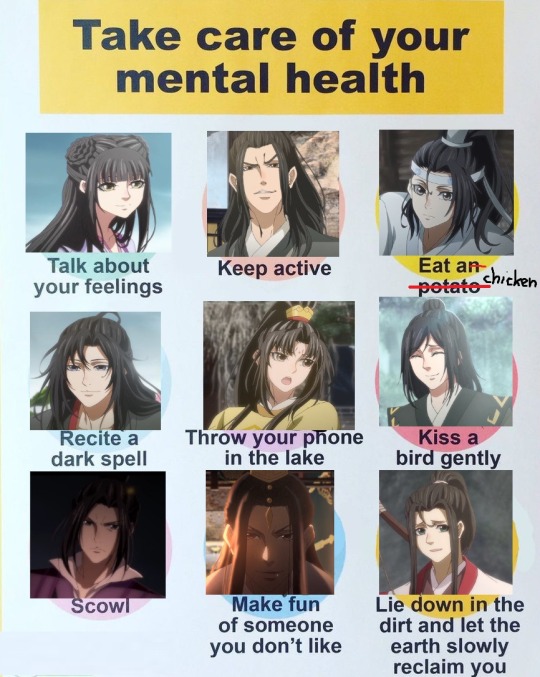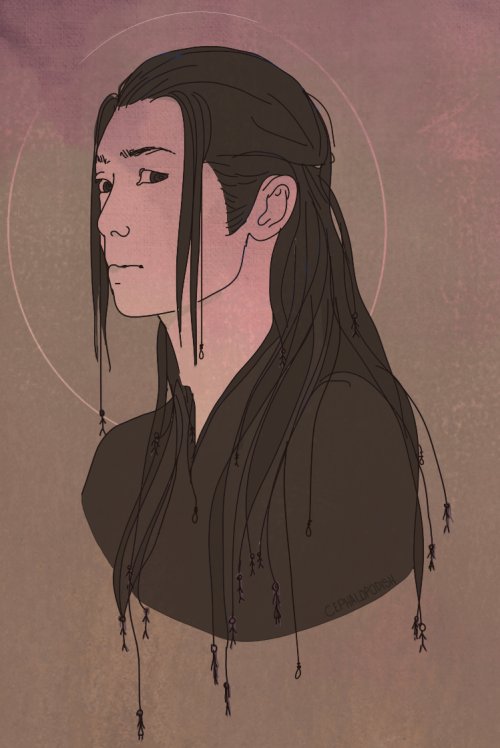#wen remnants
Mostly in the context of Mo Dao Zu Shi, although you could apply this to other wuxia/xianxia as well.
I’ve seen a lot of people pointing out the so-called “hypocrisy” of the Lan Sect, with two main examples: Lan Wangji’s punishment, and allowing the destruction of the Wen Sect. I would argue that by ancient Chinese morality standards, the Lan Sect remained perfectly righteous throughout. Just as you should not apply modern morality to a medieval fantasy story (I don’t know or remember GOT very well but imagine getting mad at Ned Stark for being a murderer), you should not apply modern Western morality to a wuxia/xianxia/xuanhuan story.
Let’s start with Lan Wangji’s punishment, since that’s somewhat easier to address. First of all, recall that Lan Xichen and Lan Qiren specifically selected thirty-three elders who had watched Lan Wangji grow up and cared about him. Even with his ridiculous cultivation level, there is no way that Lan Wangji could severely injure thirty-three elders who were actually out to get him – even by sheer numbers they would overwhelm him. Clearly they were unwilling to hurt him.
Now you might think this is a bit self-contradictory. After all, they did hurt him by punishing him! Quite badly! Recall that plenty of people saw Lan Wangji drag Wei Wuxian off, postponing the latter’s death by three months. The other sects simply let the Lan Sect handle the matter internally, trusting in them to see justice done. The Lan Sect couldn’t do nothing – they had to give the other sects some kind of exchange.
In other stories of this genre, (and often on characters without the protagonist halo) characters could be executed or kicked out of the sect for injuring an elder (let alone thirty-three, and after helping a mass murderer escape punishment). And when someone is kicked out of the sect, they are erased from the family records and have their cultivation base destroyed so they cannot use the skills the sect taught them to continue to do evil (that would be bad for the sect’s reputation also). So the thirty-three strikes from the discipline whip are enough to keep the other sects from complaining that the punishment was too light and Gusu Lan is protecting its own over enacting justice, while at the same time causing minimal harm to Lan Wangji and his reputation. The three years of seclusion further assisted in this – rumors die down when the subject isn’t around, and Lan Wangji already has two decades of impeccable reputation behind him. Three years gave him and the cultivation world time to heal, so that everyone could more or less forget about what happened. In addition, while seclusion sucks from a mental health perspective, I would argue it would be worse for Lan Wangji to be out in the world constantly hearing about how much Wei Wuxian was hated and how glad everyone was about his death. Three years later, everything had more or less blown over, and gossipers had moved on to more recent topics.
(Sidenote: The Lan Sect was also VERY kind to Su She, and look how he repaid them… by using their cultivation methods to do evil.)
Now let’s talk about the Lan Sect’s response to the situation with the Wen remnants.
There’s a saying that comes from a book describing propriety (《礼记》, specifically 《礼记·曲礼上第一》) that explains attitudes toward revenge.
父之讎,弗与共戴天;兄弟之讎,不反兵;交游之讎,不同国。
With the murderer of your father, you should not exist under the same sky; with the murderer of your brother, you should not return to grab a weapon; with the murderer of your friend, you should not exist in the same nation (without trying to kill them).
Wen Ruohan killed Nie Mingjue’s father, so Nie Mingjue did everything in his power to kill Wen Ruohan. But on his way to take revenge, he also killed many Wens, some of whom most definitely had sons. Nie Mingjue is allowed to get his revenge, and so are they. This can create a cycle of grudges, until many generations down the line two major families have deep grievances between them, and yet no one remembers the origin. The cycle only ends when one side is completely destroyed, and no one remains to take revenge. So taking out all the Wens at the beginning could be argued as the best method, since it minimizes casualties. By cutting off the cycle at the start, the least number of people suffer and die. (Yes, this is a bit counterintuitive.) How were the Jin or the Lan to know that the Wen remnants didn’t plan on taking revenge? By all rights they should be honor-bound to. Perhaps they should have eliminated them in a less cruel way, but if anything that makes Wei Wuxian the worst offender since he definitely went quite far in killing Wen Chao, and did far worse than the Jins did to the Wen remnants.
In this way, the Lans were still quite righteous. They did not participate much in the elimination of the Wen remnants, but for the reasons I described they could hardly argue against such an action.
(Sidenote: You may remember Xue Yang’s extermination of the Chang Clan. Xiao Xingchen is generally considered one of the most just and kind characters in the series, with the least war crimes (by modern Western standards) under his belt. Yet even he said, if Chang Ci’an cut off your finger, then you should cut off his finger! Or if you are still angry, cut off his arm! Or kill him! But why did you kill his entire family? So there’s an in-canon example of revenge for you.)
Let’s take another angle. One of the most severe punishments the Emperor could carry out in ancient China was called 株连九族, I think this is translated as “nine exterminations”. It’s only been carried out a few times in history, and is usually as a consequence of treason or plotting treason. The perpetrator, their entire extended family (so this includes servants), their teachers and students, and sometimes even neighbors are executed. I think upwards of three thousand people can be executed.
(Sidenote: this is why there’s a saying that accepting students 收徒 or studying under a master 拜师 are not casual decisions – if you choose incorrectly you could lose your head!)
By contrast, the allied sects were quite lenient on the Wens – they really only went after the main family. And while what the Wens did isn’t really “treason”, I would argue it’s worse than a single traitor trying to kill the Emperor. But the assembled sects didn’t even go after their servants, the minor sects that were their “co-conspirators”, or any of the huge multitude of people who were affiliated with the Wens. By Ancient Chinese standards, they were quite lenient (which is, again, odd to think about).
My main point is, most people who complain about how “hypocritical” the Lan Sect are miss the point. “Righteousness” by modern Western standards is not the same as “righteousness” by ancient Chinese fantasy standards. I hope that Western fans can consider that, just as you do not judge works such as Lord of the Rings by modern morality standards, you should not judge Mo Dao Zu Shi by modern Western morality standards.
Who Knew the Truth About the Wen Remnants?
(finally cross-posting from Ao3)
In the story of Modao Zushi, we see a group of people being rounded up and placed in a restricted settlement, then shuffled to a prison labour camp, and eventually be massacred and thrown in a mass grave. The treatment of the Wen remnants by the sects and their eventual fate bear similarities to real ethnic cleansing/genocide attempts, and I find the way that fandom tries to mitigate and even ignore it deeply disturbing.
I think that part of it is because people like these characters. They don’t want to take a long hard look at them and admit that they were either complicit or active participants in such an atrocity. How could people who are supposed to be righteous, like Lan Xichen, Nie Mingjue and Lan Qiren, do such a monstrous thing?
People want to believe that they didn’t know. That the Jins were engaging in a massive smear campaign against Wei Wuxian and that the sects were deceived into thinking that the people in the Burial Mounds settlement were an army. But I don’t think the text backs that up, and am going to be going over it very closely to try to build a clear picture of what was known about the Wen remnants by the cultivation world, and who was involved in their massacre.

icons:@yilingicons


